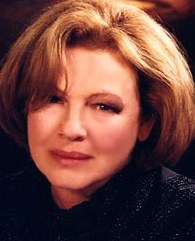channing tatum - a guide to recognizing your saints cast & crew
|
The Vow 2012
21 Jump Street 2012
Haywire 2012
The Son of No One 2011
Dear John 2010
Fighting 2009
Stop-Loss 2008
Step Up 2006
She's the Man 2006
|
 Using her nervously flashing squinty-eyed smile and breathy, almost girlish speaking voice to great effect, character player Dianne Wiest has proven equally adept at portraying ditsy, somewhat neurotic comic characters, classically tragic figures and maternal authority figures. Using her nervously flashing squinty-eyed smile and breathy, almost girlish speaking voice to great effect, character player Dianne Wiest has proven equally adept at portraying ditsy, somewhat neurotic comic characters, classically tragic figures and maternal authority figures.Attractive but not conventionally beautiful by Hollywood standards, this stage-trained performer has had only rare screen roles that allow her to unleash the full force of her capabilities. Nevertheless, she has emerged as an actress who commands respect and admiration--and along the way netted numerous accolades and encomiums, including a pair of Best Supporting Actress Oscars.
The eldest child and only daughter of a pilot and a nurse, Wiest was an "Army brat" who grew up in several communities in the USA and Germany. While a teenager, she studied at the School of American Ballet which she abandoned at age 16 in favor of the stage. Dropping out of college, Wiest became a member of a touring Shakespeare company and eventually landed a four-year gig as a member of the Arena Stage in Washington, DC.
By the mid-1970s, the actress had settled in NYC and quickly found employment in productions at the New York Shakespeare Festival's Public Theatre. Wiest broke through with a multiple award-winning comic turn in the Off-Broadway play "The Art of Dining" in 1979. Despite the lure of film work, she has constantly returned to the stage, often in dramatic fare such as playing Desdemona to James Earl Jones' "Othello" (1982) and Maggie to Frank Langella's Quentin in "After the Fall" (1984) or a Holocaust survivor in "Blue Light" (1994) or its revision "The Shawl" (1996), and almost always to unanimous praise.
In a handful of small screen productions, Wiest turned in fine work, including her moving depiction of a rape survivor in "The Face of Rage" (ABC, 1983). By this time, she had begun making inroads in features in routine roles (e.g., John Lithgow's long-suffering wife in "Footloose" 1984) but it took joining Woody Allen's unofficial stock company for her profile to rise. In "The Purple Rose of Cairo" (1985), the writer-director cast her in the small but memorable role of a hard-bitten prostitute.
Wiest picked up her first Academy Award for her scene-stealing turn as Mia Farrow's younger sister, a neurotically unfocused, superficially trendy wannabe actress, in "Hannah and Her Sisters" (1986) and lent a similar garrulous charm to the maiden Aunt Bea in the nostalgic "Radio Days" (1987). In Allen's turgid "September" (also 1987), she again stood out as an unhappily married woman competing with her best friend (Farrow) for the attentions of the same man (Sam Waterston). It is doubtful that another actress could have telegraphed the character's sexual desire mixed with apprehension that Wiest so convincingly manifests.
Her work with Allen was interrupted by a motherhood—both on screen and off (the actress has two adopted daughters). After the Oscar win, Hollywood cast her in a string of maternal roles. You name it, she played it: from the clueless mom of a budding vampire in "The Lost Boys" (1987) to the sainted Madonna of "Bright Light, Big City" (1988) to the ditsy Avon Lady of "Edward Scissorhands" (1990). Ron Howard's "Parenthood" (1989) netted Wiest a second Academy Award nomination for playing the harried, divorced parent of teenagers. In the span of some seven years, only "Little Man Tate" (1991) offered a (very) slight change of pace, casting her as a caring child psychologist in conflict with the mother of boy genius.
It was Woody Allen who again provided a meaty and decidedly different character, the flamboyant, tempestuous aging actress Helen Sinclair in "Bullets Over Broadway" (1994). At first, Wiest struggled with the role and after the first dailies, offered to quit as she felt miscast. Finally, the actress was able to unlock the character by locating a distinctive vocal inflection. Using her "stage voice"--a bit deeper, more sensual, in Allen's words "more pretentious"--she was able to inhabit the skin of this oversized, slightly campy grande dame and again all but stole the film. Critics and audiences embraced the character—and her exhortation "Don't speak!" and Wiest amassed yet another set of trophies, including a second Oscar.
Mike Nichols paired her with Gene Hackman as the conservative parents of a daughter marrying into an unconventional family in "The Birdcage" (1996). She added an Emmy to her collection for a 1996 guest appearance on "Avonlea" (The Disney Channel) before Robert Redford tapped into her beaming maternalism for "The Horse Whisperer" (1998). But the actress seemed to stumble a bit in her over-the-top interpretation of an eccentric training her nieces in witchcraft in "Practical Magic" (also 1998). Wiest picked up an Emmy nomination for a supporting role as a diner owner and friend to a seemingly ageless carpenter in "The Secret Life of Noah Dearborn" (CBS, 1999). The actress then was tapped to play a wicked queen who plots to usurp the throne of mythical monarchy in the lavish, big-budgeted TV miniseries "The 10th Kingdom" (NBC, 2000).
A return to the big screen found Wiest playing the agoraphobic neighbor of a mentally retarded man (Sean Penn) fighting for custody of his seven year-old daughter in “I Am Sam” (2002). In “Merci Docteur Rey” (2004), she played the opera diva mother of a gay man (Stanislas Merhar) who doesn’t know her son is gay—the farcical comedy barely made a blip on the box office radar. Meanwhile, Wiest was the voice of Mrs. Copperbottom in “Robots” (2005), a well-reviewed animated feature that depicted a world entirely inhabited by mechanical beings.
|